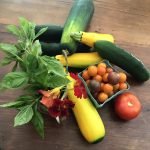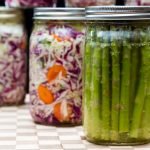 Gardening is at an all-time high this summer because of the pandemic. Many of you smartly decided to create veggie gardens. If you are new to gardening or just exuberant about growing plants, you might find yourself overwhelmed with too many veggies to consume on your own.
Gardening is at an all-time high this summer because of the pandemic. Many of you smartly decided to create veggie gardens. If you are new to gardening or just exuberant about growing plants, you might find yourself overwhelmed with too many veggies to consume on your own.
One good way to deal with this is to just eat more vegetables than normal. If there is one thing nutritionists and nutritional scientist all over the world agree on it is that we need to eat more veggies! You may find that you feel better on many different levels as you heap your dinner plate with veggies.
Veggies are highly anti-inflammatory, anti-aging, and chock full of nutrients that are necessary to provide optimal health. They are also low fat, low calorie, and full of fiber which is great for your gut health. Vegetables, which contain phytochemicals or plant based biologically active substances, can help prevent against cancer and other diseases such as type 2 diabetes, stroke, heart disease, and high blood pressure.
If you find yourself with an overabundance of produce this summer, here are ideas to help you manage:
- Celebrate NH Eats Local this Month by sharing veggie-filled goodie bags.
 Everyone who loves vegetables loves them fresh. Having friends or family over for a safe social distancing gathering? Like your neighbors? Fill paper bags with garden-fresh veggies and hand them out. Email them your favorite recipes for cooking inspiration or tuck printed cards in each bag.
Everyone who loves vegetables loves them fresh. Having friends or family over for a safe social distancing gathering? Like your neighbors? Fill paper bags with garden-fresh veggies and hand them out. Email them your favorite recipes for cooking inspiration or tuck printed cards in each bag. - Preserve your pickings.
It takes time and effort to prep and process fruits and vegetables, but you will be rewarded with peak-flavor results all year long. And, if food is at peak-flavor you can also assume that nutrients are at a high point as well.
The National Center for Home Food Preservation (NCHFP) is a reliable resource for home preservation of foods. This is important because there is quite a bit of conflicting and inaccurate information on the internet about canning. NCHPF is part of the official United States Department of Agriculture (USDA) and canning safety is their number one concern.
You can also learn more about other forms of preserving such as freezing, pickling, dehydrating and fermenting foods on this website: https://nchfp.uga.edu/
- Try quick pickling.
Quick pickling vegetables is easy, quick and a great way to bring new life to your veggies. Brining and marinating vegetables adds zip and increases short-term storage life. Canning on the other hand requires a stronger brine and a hot bath incorporating more steps which can make it more complicated.
You can quick pickle just about any vegetable ranging from cauliflower, to carrots, radishes, onions, beets, green beans, peppers, cucumber, and cabbage. The first step is to make a brine with one cup water, 2 teaspoons non-iodized salt and 1 cup vinegar. Heat the water until steaming, add salt and let it dissolve, then add vinegar. Next step is to choose your veggies and spices for pickling and about 2 cups of veggies is good. Add your ingredients to a lidded non-reactive container (like a glass jar or ceramic vessel). Pour liquid over ingredients so that they are covered (you may not need all of the liquid). Last step let it cool to room temperature and let your concoction pickle for at least an hour.
Bear in mind that most quick pickling recipes will only last for 2 to 3 weeks in the refrigerator. But it is a great way to extend the life your crop and add another delicious layer of flavor to your meals.
- Ferment your veggies.
 The difference between fermented and pickled veggies is that pickling involves soaking foods in an acidic liquid to achieve a sour flavor. When foods are fermented, however, the sour flavor is a result of a chemical reaction between a food’s sugars and naturally present bacteria — no added acid or heat required. The benefit of the fermented food is the production of probiotics or healthy bacteria that are great for your gut health.
The difference between fermented and pickled veggies is that pickling involves soaking foods in an acidic liquid to achieve a sour flavor. When foods are fermented, however, the sour flavor is a result of a chemical reaction between a food’s sugars and naturally present bacteria — no added acid or heat required. The benefit of the fermented food is the production of probiotics or healthy bacteria that are great for your gut health.
Like quick pickling this is simple and easy too. Check out the recipes for Fermented Carrots and Fermented Ginger-Shredded Carrots in my book Cool the Fire: Curb Inflammation and Balance Hormones available at The Toadstool Bookshop.
- Cook a meal for a neighbor.
You may be sick and tired of all that zucchini in your garden, but your aging neighbor a couple of houses down might really appreciate that delicious ratatouille dish you make. Who wouldn’t love a home cooked meal featuring nutritious and flavor-packed ingredients from your garden?
Whether you have a garden or not this summer, produce is in abundance everywhere you look in the month of August. Hopefully these ideas will help you take advantage of low prices and fresh foods.

